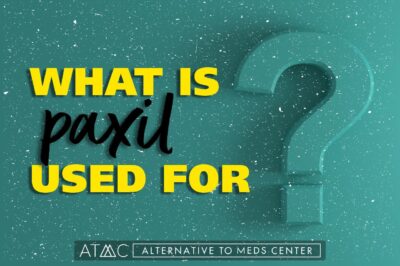What Happens When You Stop Taking Paroxetine?
As mentioned above, abruptly stopping paroxetine can cause you to experience withdrawal symptoms, and in some cases, those symptoms can be severe and last a very long time. Even missing a dose can trigger withdrawal symptoms and cause your original symptoms to recur.
The half-life point is an approximate predictor of when withdrawal symptoms may appear. Both versions of paroxetine have a very short half-life, compared to other SSRIs.1,20,21
- Paxil immediate release has a half-life of 21 hours.
- Paxil controlled release has a half-life of 15-20 hours
- Prozac (fluoxetine) has a half-life of 2-4 days
An important point to consider is that some Paxil products are time-release, or controlled-release, and you may need your prescriber to transition you to an equivalent dose of another SSRI such as Prozac, to avoid complications with measuring and cutting the dosage. The time-release characteristic of a drug will be lost by simply cutting the tablet. In the case of Paxil controlled-release, the half-life is extremely shortened by cutting the pills. So experts recommend you seek Paxil tapering help from a medical professional who can help with this transition, and who can help you navigate a tolerable, gradual reduction of dosage over time.
It is recommended by researchers to ensure adequate time (several weeks, or longer) between dose reductions to allow symptoms of withdrawal to subside before making subsequent reductions. This is an important point as withdrawal symptoms are often misidentified by prescribers unfamiliar with Paxil withdrawal who may interpret these as “relapse.” The symptoms of relapse and withdrawal are difficult to distinguish because the symptoms commonly overlap, which may result in a misdiagnosis.7,16-18
Ways To Cope With Withdrawal Symptoms
Coping with withdrawal syndrome can be a challenge, especially if you suffer from severe withdrawal symptoms. You should always obtain medical advice and support and discuss all options with your healthcare provider. If your prescriber is not certain or familiar with managing Paxil withdrawal, find one who is confident they can help you. It is not uncommon for prescribers to be unaware of the complexities involved with coming off a drug like Paxil.
In addition to seeking professional medical advice, you can:
- Reach out to a support network.
- Follow a healthy diet.
- Get regular exercise.
- Monitor your mood and warning signs.
Alternative to Meds Center has developed an arsenal of Paxil alternative treatments that can safely and effectively help a person restore and preserve natural mental health. Along with helping clients complete their paroxetine withdrawal program, we offer a wide range of therapies to address specific health issues relating to sleep, mood, energy level, stress reduction, and much more.
Withdrawal Treatment Options
Withdrawal from Paxil can be mild for some, and severe for others. To ease your withdrawal symptoms, discuss these options with your healthcare provider.
Therapy
CBT is a form of therapy that can be effective when recovering from withdrawal and dependence. With the addition of psychological therapy to your treatment program, you receive an individualized, customized approach to your health and well-being, allowing you to address your mental health challenges as part of a program of recovery. Working with the advice of a medical professional, you can find the right combination of treatments you need.8
Tapering
As a selective serotonin reuptake inhibitor (SSRI) antidepressant medication, paroxetine blocks serotonin reabsorption causing an artificial buildup. As a result, if you stop taking paroxetine abruptly, this shocks the central nervous system. Paxil tapering help can minimize this shock.
Alternative Treatments
When you need to ease your discontinuation symptoms, discuss with your doctor whether any of these alternatives can help:
- Supplements: Your healthcare provider can discuss whether any over-the-counter treatments, such as vitamins, minerals, and amino acids can boost the production of naturally occurring neurotransmitters precursors and help ease withdrawal symptoms.
- Diet: Discuss with a medical professional how improving the diet such as the Mediterranean diet, can provide your body the raw materials needed for recovery. Another example, cutting out or limiting caffeine and sugar, can help you cope better with withdrawal symptoms.12,15
- Exercise: Although all exercise plans should be discussed with your healthcare provider, remember that even a short walk can benefit your recovery.11
- Learning stress reduction techniques can be extremely profitable for improving mental health symptoms without relying on pharmaceutical products.13
- Removal of accumulated chemical toxins from the body is an often overlooked strategy in mental health symptoms as the presence of symptoms and toxins in the body are often linked.14
Seeking Support
Paroxetine can interfere with your daily life by creating possible side effects while you are taking the drug and the potential for withdrawal if you decide to stop taking it. If you need Paxil tapering help so that you can discontinue your medication safely or you need help dealing with withdrawal symptoms, discuss all of your alternatives with your healthcare provider.
If you need additional support and want to explore Paxil alternatives, don’t hesitate to reach out to your healthcare provider and contact Alternative to Meds Center.

 Generalized anxiety disorders (GAD)
Generalized anxiety disorders (GAD)







